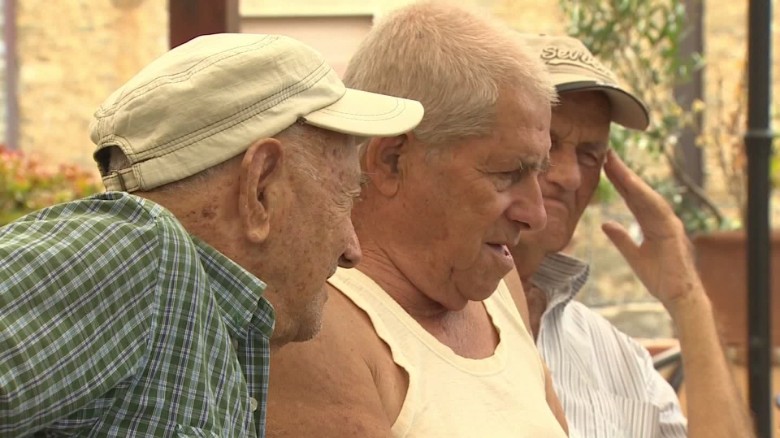“Eat badly and work hard,” 94-year-old Giuseppe told me when I asked him the secret to a long life.
Giuseppe was taking me to his garden, which he tends to every day, growing tomatoes, peppers, lemons, oranges and lotus fruit.
We had come to his hometown of Acciaroli, south of Naples, for a report on the amazing longevity of its inhabitants, one in ten of whom, according to Mayor Stefano Pisani, is classed as a centenarian.
The reasons put forth for their amazing longevity are many — the so-called “Mediterranean diet,” regular exercise, a mild climate …
For his part Giuseppe laughs off all the talk about clean living, pointing out that until five years ago he smoked two packs of cigarettes a day.
His prescription is somewhat more adult-themed. His secret? “Donne,” he says — women.
He told me that after his wife died six years ago he became depressed. “But then,” he recalls, “I thought it’s not the end of the world. I should go on living. So I asked a donnina (‘little woman’) if she would go with me, and she said yes.
“I noticed that too is indispensable,” he says. “It makes you happy, more cheerful.”
“But does it still function?” I asked.
“Of course!” he replied. “Once it really worked.”
A neighbor told us Giuseppe had already gone through several caregivers because he had made too many unwanted advances.
Just where the Mediterranean diet comes in to this was — so far, at least — something of a mystery. The diet consists of plenty of fresh fruit and vegetables, a modest quantity of carbohydrates, and fish.
The next morning Elisabetta, the mayor’s assistant, took us to the home of Caterina, 81, who was going to show us how to prepare a typical meal based on the Mediterranean diet.
So while she was cutting up potatoes, tomatoes and garlic to fry with olive oil, I asked her if she liked fish. She giggled, crinkling her nose.
“No, not really. I prefer meat,” she replied. “And ice cream too. I love sweets.”
From the other room Elisabetta laughed with a hint of exasperation as this “promotional event” for the Mediterranean diet suddenly collapsed.
The elderly inhabitants of Acciaroli and the hilly coastal areas surrounding it are the subject of a study being conducted jointly by Rome’s La Sapienza University and the University of California-San Diego.
Researchers are investigating 300 local centenarians, trying to understand why people here live so long, and have such low rates of heart disease and Alzheimer’s disease.
Among the things they plan to look into is whether the high concentrations of rosemary in the diet, and lots of walking through the mountains nearby have a positive impact on longevity.
American nutritionist Ancel Keys (the inventor of K-rations, which kept US troops fed during World War Two) first identified what became known as the Mediterranean diet when he found in this part of Italy so many elderly and active people.
Keys lived here and studied the diet before passing away at the ripe old age of 100 in 2004.
Delia Morinelli, who is 79 herself, was Key’s cook for many years. Nowadays she runs a restaurant specializing in the Mediterranean diet.
Unlike Caterina, she is a passionate and emphatic advocate of that diet, and showed us how to prepare a healthy dish of pasta with chickpeas. In the restaurant’s kitchen, she had laid out bowls of tomatoes, onions, bay leaves, olives, sardines, zucchini, carrots, rosemary, celery, basil.
“When I worked for Keys,” she recalls, “we never bought meat. In this restaurant, meat doesn’t exist. And no butter, either.”
The fact is, Italians have an already healthy average life span of 82 years.
Italians do like their fresh fruits and vegetables, and in my humble opinion are some of the most food-obsessed people on earth. Food — where it’s bought, how it’s prepared and how it’s eaten — is a favorite topic of conversation.
The national health system here is considered one of the best in Europe.
And perhaps most importantly, Italians don’t believe in working themselves to the point of exhaustion to get ahead.
But it wasn’t until we met Antonio and Amina that I really got an insight into what makes people in Acciaroli live so long.
Antonio celebrated his 100th birthday last February. After a stint with the Italian Army in Ethiopia in the 1930s, he returned to Acciaroli to become a fisherman.
Back then it was a poor, remote village, without electricity or running water. People ate what they grew or caught. Life was hard: the weak died young, the strong survived.
“I remember everything,” he says. “I remember it as if it was yesterday.”
Antonio wasn’t interested in talking about diet, though. The secret of his longevity, he insisted, was “this beautiful woman, the woman of my life.”
Amina, 93, smiled shyly. Spry and good-humored, she still writes poetry, and recites it easily from memory. Her favorite is a poem she dedicated to Antonio.
“By the sea, the waves put my soul at rest
“I saw a little boat approach, a fisherman laying nets
“When he got closer, I looked at him and he smiled at me
“He invited me on board for a ride, it was a pleasure trip
“I saw seagulls flying around, fighting with the other fishermen
“I was taken by the beauty of the sea, and I became the bride of the fisherman.”
As she spoke the final line, she reached out and caressed Antonio’s chin.
Love and affection — plus all that other healthy stuff, perhaps — are the real secret ingredients of their longevity.
